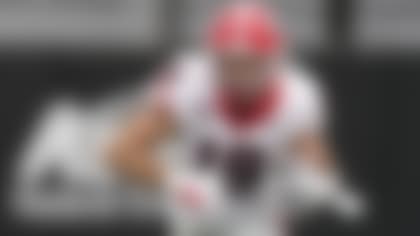When I was a scout for the Carolina Panthers, I was encouraged to value speed and athleticism as core traits for defenders, particularly pass rushers. Utilizing this approach, the Panthers were able to land elite defenders like Julius Peppers, Charles Johnson and Greg Hardy as defensive ends as well as a versatile talent in Thomas Davis..
Thus, I'm partial to explosive athletes with exceptional quickness and agility when I'm evaluating pass rushers. While those traits don't necessarily guarantee spectacular production at the next level, the combination of speed, quickness and athleticism can produce fireworks when a pass rusher blends those characteristics with sound technique and energy. That's why I was excited to take an extended look at Clemson DE Vic Beasley after hearing so much about him in the fall.
The 6-foot-2, 235-pound senior led the ACC with 13 sacks and registered 23 tackles for loss as a designated pass rusher for the Tigers last season. That kind of production is impressive for a disruptive defender, particularly a first-time starter still adjusting to the speed and tempo of the college game. Given some time to take a look at Beasley's game, athleticism and potential, here are my thoughts on the Clemson standout heading into the 2014 season:
Athleticism
Beasley is one of the best athletes in the ACC, exhibiting exceptional speed, quickness and agility for a hybrid edge defender. He displays cat-like quickness off the ball, but is capable of turning his speed into power when he engages opponents. Beasley's explosiveness and length make him a challenge to block on the edge. Additionally, his agility, balance and body control make him a nightmare to handle when he is put on the move at the point of attack.
With Beasley also displaying remarkable closing quickness and burst in the open field, NFL scouts will rank him as one of the top athletes in the 2015 class when it is all said and done. Given the emphasis on speed and athleticism in today's NFL, Beasley will shoot to the top of the charts based on his natural athleticism and explosiveness.
Run defense
The NFL is a passing league, but defensive coordinators still covet disruptive edge defenders with the ability to snuff out the run or pass on the perimeter. Beasley certainly has the potential to be a dominant playmaker on the edge, but he must convince evaluators that he can develop into a credible run-stopping threat this fall.
Looking at Beasley's play a season ago, I didn't see a disruptive run defender at the point of attack. While he gave effort and didn't lose ground at the point of attack, I rarely saw him attack, stack and shed a blocker to make a tackle in the backfield on a running play. Sure, the numbers suggest that he was a major factor against the run (Beasley recorded 44 tackles, 23 tackles for loss and 13 sacks in 2013), but I didn't see enough flashes to be convinced that he will be a productive every-down defender at the next level.
Beasley frequently battled to a draw on the edge, leaving him stuck on blocks while runners squirted through creases between the tackles. Although he eventually worked free at the line of scrimmage, Beasley's inconsistent hand skills limit his effectiveness against runs to his side.
However, against runs away from him, Beasley flashes the tools to be a disruptive force in the backfield. He flashes the speed, quickness and burst to run ball carriers down from the back side. Most importantly, he displays a feel for running through the trash to get to the rusher before he turns up the field. While I certainly would like to see more production from Beasley against the run, the fact that he is an explosive athlete with the potential to blossom into an effective "run-and-chase" player could prompt some teams to gamble on his upside instead of harping on his ineffectiveness as a power player at the point of attack.
Pass-rush ability
NFL executives place a high priority on adding disruptive pass rushers to the roster. Elite defenses are built upon the premise of creating disruption against the pass, particularly with active defensive linemen at the line of scrimmage.
Beasley is a natural pass rusher with exceptional first-step quickness and snap-count anticipation. He has mastered the art of jumping the gun, which allows him to blow past blockers before they are out of their stances. Additionally, Beasley's remarkable first step quickens the quarterback's internal clock, leading to rushed or hurried throws from the pocket. With Beasley also displaying a crafty "dip-and-rip" maneuver to complement his instant quickness and acceleration, the Clemson star has been able to run roughshod over opponents ill-prepared to deal with his overall speed and athleticism.
Beasley also showed outstanding skills as a blitzer from the second level. The Tigers took advantage of his speed and athleticism by aligning him at inside linebacker and sending him on A-gap rushes (between the guard and center) from exotic formations. By using Beasley from a stand-up position, the Tigers were able to vary his rush points and utilize his explosiveness on exotic blitzes to overpower interior blockers. Given his success executing these tactics for the Tigers, it's easy to envision an NFL defensive coordinator using Beasley in a similar fashion.
If I had to point out a flaw in Beasley's game, I would cite his limited array of rush moves off the edge. While he is a dynamic speed rusher, he hasn't developed a complementary set of pitches to accompany his fastball (speed rush). Thus, he is a "boom-or-bust" rusher who can go long stretches without reaching the quarterback off the edge. Looking at his stat sheet, I noticed that he notched nine sacks in the Tigers' first six games, but made just four sacks during the last seven contests. While it's not unusual for elite rushers to experience long droughts during the season, the fact that Beasley's sack production dwindled at the end of the year will prompt scouts to take a hard look at his overall game to see if his skills have evolved from his first season as a starter.
Looking at where Beasley's game needs to evolve this season, I would point to his need to develop more complementary moves off the edge as a rusher. Adding an effective power maneuver like a bull rush or "butt-and-jerk" move would allow him to attack with power or finesse off the edge. Given the challenges of dealing with a pass rusher with a full complement of moves, the added dimension could make him a nightmare to block off the edge.
Disruption
Playing great defense in the NFL revolves around creating turnovers at every level. Teams that are able to knock the ball loose or snatch it out of the air routinely make deep runs in the postseason.
Beasley has the potential to be a turnover machine as a pass rusher in the league. He is quick enough to blow past blockers on speed rushes, while also possessing the agility and athleticism to win movement-based rushes (stunts, angles and games). Given his speed and overall explosiveness, Beasley can wreak havoc off the edge and knock the ball loose on tomahawk chops or swipes when attacking the quarterback. Although his career stats reflect just five forced fumbles in 864 snaps (31 games), the fact that he has been able to post 21 sacks in 13 career starts suggests that he is an emerging playmaker with the potential create chaos as a rusher when he refines his game with more repetitions and experience.
Thus, I believe NFL scouts will place a greater emphasis on Beasley's athletic potential and game development over his production at this point. If he can continue to flash tantalizing athleticism, while also making enough splash plays to convince evaluators that he can be a difference maker in time, Beasley will earn high marks in war rooms around the league as a designated pass rusher.
Conclusion
Every NFL evaluator would love to find a finished product, but the best decision makers are capable of identifying the developmental potential of dynamic athletes and forecasting their impact as disruptive players. Beasley is an intriguing developmental prospect with immense talent and potential. While some viewed the Clemson star as a borderline first-round prospect following a spectacular junior campaign, I believe Beasley is an elite athlete with the potential to develop into a blue-chip prospect by season's end. Of course, this is the same premise that helped Barkevious Mingo and Dion Jordan land in the top 10 in the 2013 draft, but Beasley is a more natural rusher than those guys and displays better instincts as a player.
If Beasley can show better strength and power against the run, while adding a move or two as a pass rusher, he can play as a stand-up 3-4 Rush linebacker or thrive in a Von Miller-like role as a hybrid Sam linebacker in a 4-3 scheme.
Follow Bucky Brooks on Twitter @BuckyBrooks.













